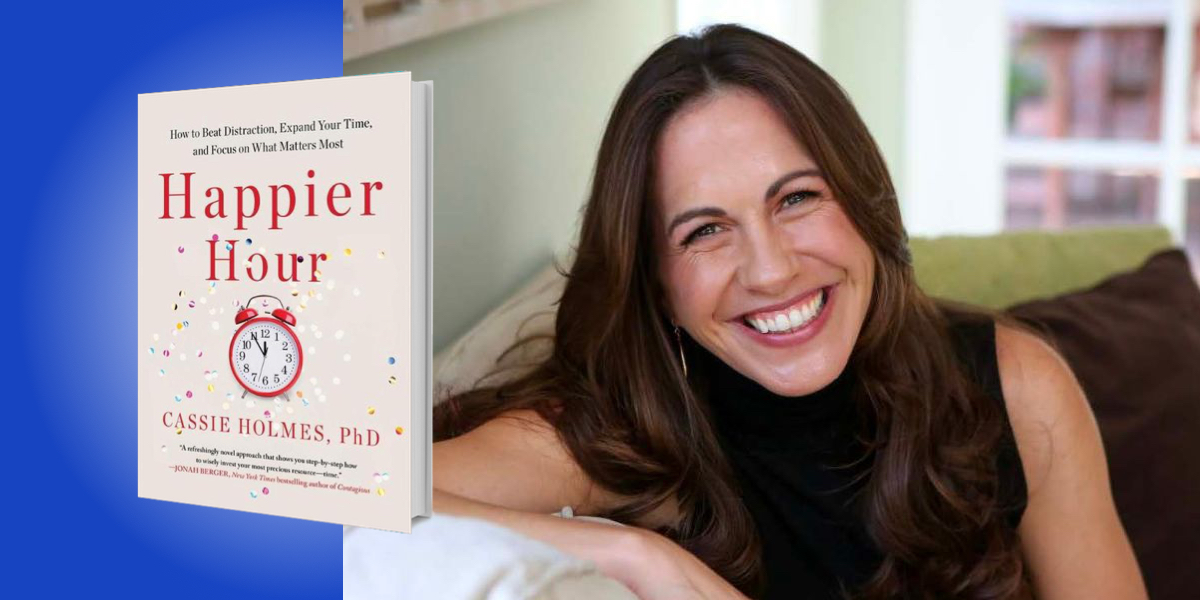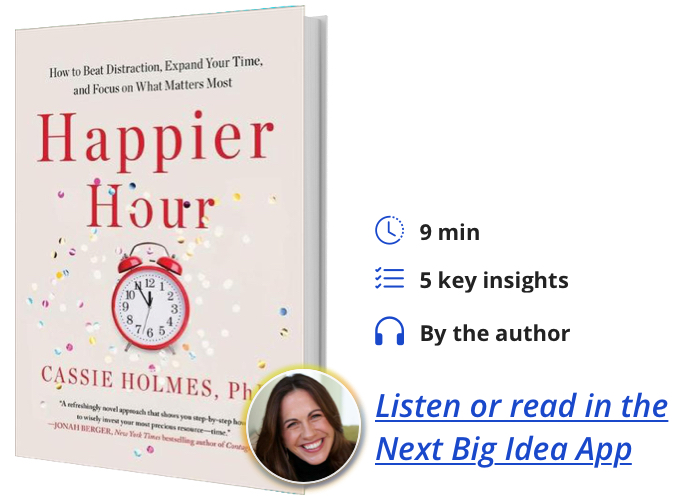Cassie Holmes is a professor at UCLA’s Anderson School of Management, where she is an award-winning teacher and researcher. Holmes’s work on the intersection of time and happiness has been widely published in lead academic journals and featured in such outlets as NPR, The Economist, The New York Times, The Wall Street Journal, The Atlantic, The Washington Post, and more.
Below, Cassie shares 5 key insights from her new book, Happier Hour: How to Beat Distraction, Expand Your Time, and Focus on What Matters Most. Listen to the audio version—read by Cassie herself—in the Next Big Idea App.
1. Time poverty is a serious problem.
Time poverty is the acute feeling of having too much to do and not enough time to do it. In a nationwide poll, nearly half of Americans declared feeling time-poor. Moms tend to feel more time-poor than dads, and working parents tend to feel particularly impoverished, but all types of people lack time, including those who don’t have kids and those who don’t work for pay. And it is not an American phenomenon: People across the globe report suffering from a hectic pace of life with too little time.
Given its prevalence, it’s important to realize that the effects of feeling rushed are serious. Studies show that when we feel time-poor, we are less healthy (less likely to exercise, for example), less kind (less likely to take the time to help others), less confident, and less happy.
2. To combat time poverty, one option is doing more.
Research shows that one solution for time poverty is not to do less. Rather, spending time in specific ways can increase your time affluence. Here are some activities for counteracting feeling time-poor:
- Get moving – Exercise is an effective way to increase self-efficacy (i.e., confidence in being able to accomplish all you set out to do). Even though you may shirk going for a morning run when you don’t have time, by making the time to exercise, you’ll get the sense that you have all the time you need to accomplish what matters.
- Practice acts of kindness – When in a rush, we often don’t slow down for others. Yet, our experiments show that because spending time to help another makes you feel surprisingly accomplished, giving time can give time back—making you feel like you have more of it.
- Experience awe – Studies show that feeling a sense of awe can expand your perspective and sense of time. So, forge a deep sense of human connection, step into nature, or book tickets to a concert. You’ll be glad you spent the time.
By spending time on such activities, we see that—to be happier—we have all the time we need!
3. More time doesn’t promise happiness.
Earlier in my career, when I felt extremely time-poor with a high-pressure job and a new baby, I thought the solution was clear: quit. That way I’d have more time to spend with my family and do whatever else I wanted. I believed that with more time, I’d be happier. However, before quitting the career that I’d worked so hard for, I realized this was a theory worth testing.
“With nothing to show for how they’d spent the day’s hours, people lacked a sense of purpose and felt dissatisfied.”
I recruited a couple of my favorite collaborators to examine the relationship between the number of discretionary hours people have in their days and their happiness. The pattern of results was surprising—showing an upside-down U-shape, like an arc or a rainbow. On one side, we saw the known drop in happiness from having too little time, which is driven by heightened feelings of stress. But on the other side, we also saw a drop in happiness. There was such a thing as having too much time! Digging into this pattern, we realized that people are driven to be productive and are averse to being idle. With nothing to show for how they’d spent the day’s hours, people lacked a sense of purpose and felt dissatisfied.
As someone who finds purpose in my work, these results taught me that quitting to have more time wouldn’t make me happier. They also revealed that (except at the extremes) the level of happiness we feel is unrelated to the amount of available time we have. The real answer for greater satisfaction isn’t about being time rich, it’s about making the time we have rich.
4. Be invested while doing chosen activities.
Research shows that we are distracted and not thinking about what we are currently doing almost half of the time. This means that even when we are spending time on enjoyable activities, we could very well miss out on potential joy.
To be fair, it’s easy to not pay attention. Often, the activities that make us happiest are simple, ordinary experiences. Because they are so “everyday,” we expect they will continue to happen every day, and thus take them for granted.
However, by counting the number of times you have left to do that activity in the future, and from that, calculating the percentage of total times in your life, you come to realize just how limited and precious those times are.
“Often, the activities that make us happiest are simple, ordinary experiences.”
For instance, when I realized that my daughter and I likely have only 35 percent of our total coffee dates together left (and she’s only 7 years old!), it urges me to carve out and protect this time in my schedule. It also makes me pay attention in those moments we get to delight in each other’s company, with warm beverages, and nibbling on flakey croissants. During this half-hour, I put my phone away and quiet the to-do list in my mind. This is our time, and I don’t want to miss a second of it.
5. Keep the end of life in mind.
What legacy do you want to leave? How do you want to be remembered and described once you’ve passed on? Though a seemingly morbid exercise, projecting forward to the end of your years and looking back at the life you aspire to live clarifies your values and purpose. Indeed, our research shows that people who take a broader perspective of time—thinking in terms of years, instead of hours—experience greater happiness and meaning in life, because they spend time on what’s important, and not merely on what seems urgent.
As you’re deciding how to spend the upcoming hours, keep in mind the life you will look back on happily, without regrets. A satisfying life starts with a happier hour.
To listen to the audio version read by author Cassie Holmes, download the Next Big Idea App today:

































